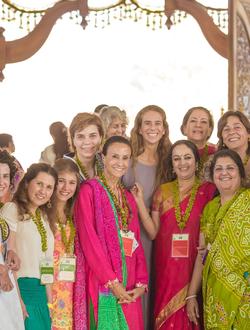A few years ago, I was at the Microsoft campus in Seattle to facilitate the Transformational Leadership for Excellence program -for women managers of the Azure business. It was a program specially designed to address the challenges faced by mid-senior level women at the workplace. The group comprised of talented and dynamic women from around the world, successful in their professions. One of the modules was on work-life balance. As we progressed in the discussion, one of the women came up to me with tears in her eyes. She said she urgently needed to call her husband and wanted to be excused from the class. I agreed. She came back after 15 minutes looking visibly relieved. In the next break, she shared with me that during the reflections of the work-life balance session, she realized that since the last 5 years or so, she had not spent one on one time with her husband. She had had 2 children in quick succession, and between work, taking care of the home, the needs of two babies, their infant illnesses, etc, she had not a single evening free for her husband. The program triggered this realization and the same evening she went for a date night with her husband, requesting a friend to watch over her toddlers. She emailed me later that this was the happiest evening for her in a long time and had decided to plan at least one such evening a month going ahead.
This seems like a simple situation- yet scarily familiar with working women all over the world. I have heard interviews of Indra Nooyi where she speaks about the challenges she faced as she progressed in her career- how she had to make difficult choices, sacrifice family events at times, be in office when a child was ill and more. She even said that it’s a myth that women can have it all. She speaks often of how when she came home on the day she was elected Pepsico President and shared this news joyfully with her mother, the first thing her mother said was that milk was over and she should rush to the nearest supermarket for a refill!
Closer to home, my mother worked for the Reserve Bank of India, retiring 12 years ago, completing her full-service term. All through our childhood and growing up years, I have seen her literally be on a bullet train speed as she multi-tasked, balancing our needs, that of my aging grandparents and her work demands. I can’t remember her taking too much leisure time off.
I travel a lot around the world and have seen this happen in the country after country. What is the cost of professional success for women? Are we really sensitive and cognizant of the toll life takes on women who are in high-pressure jobs? No matter how tough a woman’s professional role maybe, she is still considered the primary caretaker and homemaker. Many women can’t or choose not to live through this stress- My Linked In connections list proves it – Many of my women friends who I started out with, are nowhere near the CEO/MD titles in comparison to my male friends who started at the same time. The women who persist through it, suffer pangs of guilt, not to mention feeling continuously torn between two worlds. Of course, there are many exceptions, and we have many women in successful positions, who deal very well with such challenges.
What can workplaces do to support women better? What can women do to support each other better? To create coalitions and communities to watch out for each other? Sheryl Sandberg’s Lean In initiative, the United Nations women program and many organizations globally are creating platforms where women can come together, share their stories and draw strength from each other. Recently BBC has launched the 100 Women initiative aimed at empowering women in the world to find their voice. Once every two years the Art Of Living Foundation hosts the International Women’s Conference was close to 1000 women from 90-100 countries come together for 3 days- discuss, reflect, share and celebrate each other’s stories and lives. I always come away from this conference feeling extremely inspired and empowered. I am looking forward to the next conference in Feb 2020, in Bangalore India.
In Sri Sri University, I launched Charchika- The Women’s Leadership Forum, with the vision of bringing women of substance to our campus, so our young girl students have many examples to pursue their dreams and find their voice.
As women, we bring our unique strengths to the roles we play. There is research that shows how companies with more women on boards are more ethical and profitable, how countries with more women in government are less corrupt and more such. How then can we pursue the professions of our choice, without having to forgo and sacrifice on the personal front? In my life, I found the incredible treasure of spirituality- the peace of meditation and the solace of knowledge to help me through my difficult times. To help me keep the course and not lose heart.
Rajita Bagga, President, World Forum for Ethics in Business. President, Sri Sri University CEO, and Asia

















